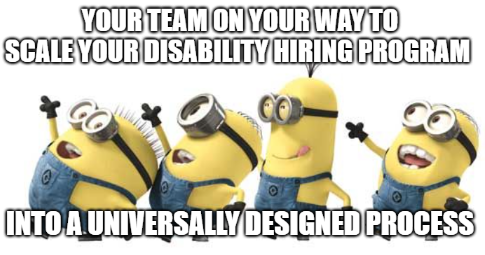Scaling Disability Hiring: From Pilot to Practice
Launching a disability hiring program is a powerful move. It shows commitment, signals progress and creates real opportunity.
But the truth is, a strong start isn’t enough.
Without a plan to scale, programs stall. Momentum fades. And all that early success? It becomes a well-meaning blip instead of a meaningful shift.
What comes next determines whether your program is a pilot—or a lasting part of how your organization hires, supports, and grows talent with disabilities.
Scaling Means Building for the Long Game

That means:
- Embedding disability inclusion into everyday systems, not keeping it as a side project
- Creating consistent infrastructure so new teams can onboard without reinventing the wheel
- Normalizing accommodations, communication preferences, and support—until they’re just how things are done
- Reinforcing manager readiness so hiring doesn’t depend on one champion’s enthusiasm
Assess What’s Working—Before You Scale
Not all growth is good growth. Before expanding, take stock of your current program.
What to evaluate:
- Which departments or roles have successfully hired and supported employees with disabilities?
- Where have bottlenecks occurred—during sourcing, onboarding, or support?
- Are accommodations being delivered quickly and consistently?
- Do hiring managers feel confident, or hesitant?
Scaling works best when built on a foundation that’s already functioning well. Prioritize the areas with the strongest outcomes and clearest processes. Then use those wins as your model.
Create Infrastructure That Supports Growth
A sustainable program doesn’t rely on one person, one spreadsheet, or one passionate team. It has infrastructure.
- A central accommodations process that’s easy to navigate
- Standardized interview prep, onboarding checklists, and support plan
- Accessible training resources for managers, recruiters, and team member
- A way to track outcomes, resolve issues, and continuously improve
When these elements are in place, scaling becomes repeatable—not risky.
Make Disability Hiring Everyone’s Responsibility
To scale and sustain disability hiring, responsibility needs to be distributed:
- Recruiters should understand accessible sourcing and screening
- Hiring managers should be trained to support neurodivergent and disabled employees
- HR and IT should ensure tools and systems are accessible from day one
This shift moves disability hiring from a “program” to part of the organization’s DNA.
Think in Phases, Not Perfection
Sustainability doesn’t require getting everything right all at once. It requires getting better over time.
- Smart scaling starts small, tests often, and adjusts quickly. Consider:
- Piloting in one new department before rolling out company-wide
- Gathering feedback from candidates and employees at every stage
- Making small process changes that have big ripple effects—like auto-captioned training or centralized accommodations FAQs
Iteration keeps your program human, agile, and resilient.
“The 5 Keys to Sustainable Disability Hiring”
-
Strong Foundation
-
Scalable Systems
-
Manager Readiness
-
Shared Responsibility
-
Iterative Growth
Scaling is having focus on making sure your hiring is built to last.
When the right systems are in place—and when everyone understands their role—disability hiring becomes second nature. It becomes something no one has to remember to do. It simply becomes part of how your organization operates.
That’s not just good for business. It’s how you build a workplace that works—for everyone.
Let’s Connect
Click here contact@sourceabled.com to connect with a Rangam SourceAbled team member to discuss how our TalentArbor technology can help you fill those gaps, and build a stronger lasting foundation.
